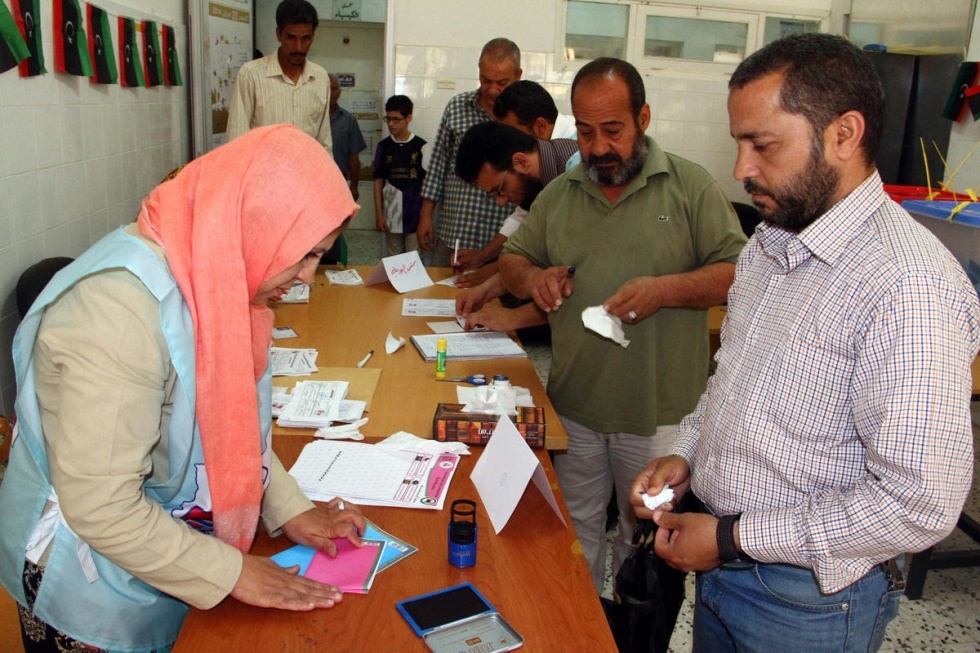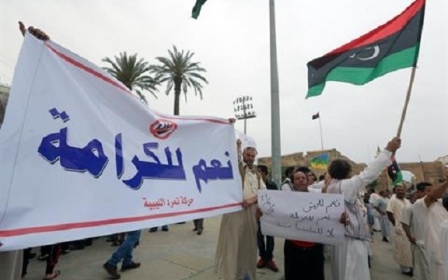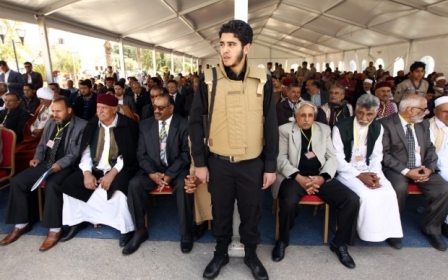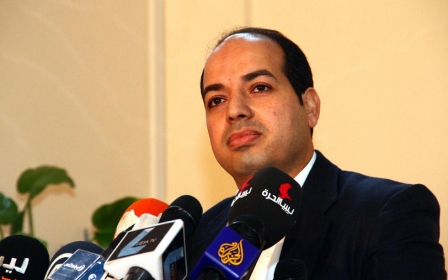Libya's two rival cabinets fight for currency reserves

Rival interim governments are disputing power in Tripoli less than four weeks before a general election, claiming control of Libya's huge currency reserves from oil and gas.
The power struggle is creating a quandary for foreign diplomats as the competing claimants trumpet their meetings as a vindication of their legitimacy.
Prime minister Abdullah al-Thani had announced his intention to step down earlier this year after an armed attack on his family but he is insisting that his successor should be chosen by a new parliament rather than its contested predecessor.
Prime minister Ahmed Miitig insists his election by the outgoing Islamist-led parliament was valid and he has formed a rival administration which met Thursday in Tripoli.
"Which of the two governments is the central bank going to deal with, who is going to hold the chequebook and who is going to sign the deals with foreign and domestic firms?" asked analyst Salem al-Zarrouk.
New MEE newsletter: Jerusalem Dispatch
Sign up to get the latest insights and analysis on Israel-Palestine, alongside Turkey Unpacked and other MEE newsletters
Libya's foreign currency reserves built up from past oil and gas earnings still stand at more than $100 billion, but they have been depleting fast from $132 billion last July.
A still unresolved rebellion for autonomy in eastern Libya has cut oil exports from 1.5 million barrels per day to just 240,000 bpd.
That has reduced earnings from $4.6 billion a month to just $1 billion, far short of the $3.5 billion the central bank says Libya needs each month just to cover imports.
Speaker Nuri Abu Sahmein has warned Thani that he could face criminal prosecution for his refusal to hand over the premiership in accordance with the vote in the General National Congress.
Crisis complicated by the 'coup' factor
The GNC's opponents questioned its legitimacy after it prolonged its mandate, due to expire this February, until December, but later agreeing to a June 25 election for a successor body.
It says that its election in Libya's first-ever free polls in July 2012 gives it executive as well as legislative authority until then.
The power struggle in Tripoli has brought to a halt negotiations on reopening two key oil terminals which remain under blockade by rebels demanding autonomy for the east.
They want a return to the federal constitution which Libya had for the first 12 years after independence in 1951 with key spending powers in the hands of three regions.
And as the rival prime ministers square off in Tripoli, waiting in the wings outside Benghazi is a former general and longtime US exile whose forces have launched two armed assaults, backed by air power, on Islamists in the main eastern city.
Khalifa Haftar claims his forces represent the legitimate national army, but his Islamist opponents accuse him of plotting a coup in Tripoli.
"Now we have two governments and pretty much two parliaments and two armies," said Suleiman Dogha, a former political leader in the 2011 uprising that toppled and killed longtime dictator Moamer Gaddafi.
Libya militia wants action on 'interfering' states
Meanwhile, a Libyan Islamist militia on Thursday asked the Libyan government to summon the ambassadors of certain countries in order to express its objection to what it describes as interference by these countries in Libya's affairs by supporting renegade general Haftar.
"The government must take decisive measures against actions that harm Libya's security and stability committed by countries apprehensive of the Arab Spring," the Libya's Revolutionaries' Operations Room said in a statement.
The leaders of the room said they had asked the government to officially protest interference by these countries in Libyan affairs, but without publically naming the countries it accused of interference.
They also called on those they described as "Libya's revolutionaries" to join forces against Haftar's forces.
On Tuesday, Libya's Ansar al-Sharia militant group issued a statement in which it warned the United States against interfering in Libya's domestic affairs.
Mohamed al-Zahawi accused the United Arab Emirates, Saudi Arabia and Egypt of backing Haftar, although the governments of these countries publically deny supporting the renegade general.
Meanwhile, Haftar has welcomed former Egyptian army chief Abdel-Fattah al-Sisi's victory in Egypt's presidential election.
"Haftar will follow al-Sisi's footsteps if the Libyan people ask him to run for president," Haftar spokesman Mohamed al-Hegazi told Anadolu Agency on Thursday.
Middle East Eye delivers independent and unrivalled coverage and analysis of the Middle East, North Africa and beyond. To learn more about republishing this content and the associated fees, please fill out this form. More about MEE can be found here.




